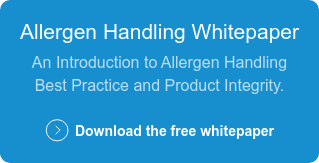Allergen handling is a responsibility that food ingredient manufacturers take very seriously in the pursuit of effective risk mitigation and consumer protection from allergenic products . The severe consequences that can be suffered when things go wrong can be catastrophic. This is why the clear labelling of products, safe storage & processing of food ingredients and traceability are all important procedures that can be safely implemented at the manufacturing stage.
Consumers rely on producers to have tight control over the presence of allergens in their products and facilities. Here, in this blog, we take a look at practices that can be put in place to help you to reduce the risks associated with allergen handling to ensure you retain your integrity and brand reputation.
Why do food manufacturers need to consider allergens?
Changes are being seen in the population - more and more people are developing sensitivities to allergens. In a New Food magazine article it is reported that 32 million Americans and up to 26 million Europeans are estimated to have a hypersensitivity to food. The symptoms experienced by allergen sufferers vary from mild to severe anaphylaxis to sickness and digestive issues. Public Health agencies that track incidences are reporting higher rates each year. In response, laws are being passed that require full ingredient labelling and traceability on how ingredients are being handled during manufacturing.
The number of foods being listed as cautions is ever increasing, over 170 foods are known to aggravate an allergic reaction. But it is widely agreed that there are 14 major food allergens:
- Celery
- Cereals containing wheat
- Crustaceans
- Eggs
- Fish
- Lupin
- Milk
- Molluscs
- Mustard
- Nuts (tree nuts)
- Peanuts
- Sesame
- Soya
- Sulphur dioxide (sulphates)
These ingredients are commonly used in the creation of everyday recipes and products. Therefore it is the responsibility of the manufacturer to ensure that these allergens are handled safely and kept separate from lines that produce allergen-free products.
How to reduce the risk of Contamination
The majority of suppliers in the food manufacturing industry have taken the allergen challenge head-on, creating new opportunities for growth and not just acting to solve the problems that are presented.

Setting up the right processes within your factory can help to reduce risk:
- Raw ingredient storage - Allergen control starts with ensuring that ingredients are handled correctly as soon as they arrive in the factory. They should be stored correctly and isolated from non-allergen products. Selected factories set up protocols that outline how to separate allergenic and non-allergenic ingredients.
- Separation – some manufacturers will programme it into the production schedules, with allergens running at the end of a shift. After which a full clean down can be performed.
- Cleaning & sanitising – thorough cleaning protocols and validation are essential if the same line is being used to handle allergen & non-allergen ingredients. Equipment is swabbed and tested regularly to confirm acceptable levels of allergen presence.
- Batch control – knowing what ingredients are used in each batch and being able to trace this through the manufacturing line and clearly label product is essential.
- Operator training – ensuring all the staff are clear on the need for careful handling will also help to reduce the risk of human error.
Traceability is a manufacturer's friend
From sourcing of ingredients and production, to storage, transportation and point of sale, trace-ability is the key to reducing allergen risk. This is the only method which tracks your procedures and guarantees your foods safety.
The World Health Organisation advises on food safety “from farm to plate.” The HACCP (Hazard Analysis Critical Control Point) system highlights where risks might transpire within the food manufacturing process and suggests what measures could be put into place to prevent those risks. The FSA also controls, monitors and advises manufacturers on food safety, labelling and processing protocols.
Ultimately, it is the manufacturer who is responsible for their products and consumer outcomes.
.webp?width=600&height=300&name=AllergensWP2-1%20(1).webp)
How Matcon System solutions have helped food ingredient manufacturers
Our expertise in the food sector has been developed over decades. As the risk of allergens has grown, so have our solutions to assist manufacturers to protect against contamination. Our specialist engineers have a range of solutions to ensure allergen risks are prevented in your facility. They have you covered in all areas of your production with containment, cleaning and storage solutions.
Primary to the solution is the use of container based powder handling. Matcon’s Intermediate Bulk Containers (IBCs) can be used to process, store and transport your bulk material ingredients, powders or granules, separating recipes during formulation, blending, packing and cleaning. The IBCs keep the contents contained, which ensures that no powder (containing allergens) escapes, contaminating other equipment and batches. IBCs maintain a dust-tight seal during discharge using the unique Cone Valve technology inside each one, eliminating any powder leakage during processing.
IBCs can safely transport ingredients around your facility and becoming the blending vessel and completely removing the need to clean the mixer between batches during a single production shift. The flexibility that IBCs give manufacturers will not only reduce risks but also increase OEE rates significantly, improving efficiency across the complete powder handling process.
There is a lot more to the design of an allergen compatible manufacturing solution, than can be explained here. We design each system tailored to the customer’s needs. We are always happy to talk to you about your project or help you to think of alternative options to manage your current challenges.
In the meantime, we would invite you to read more information on allergen prevention in food manufacturing by downloading this free whitepaper.
Posted by
Matt Baumber
